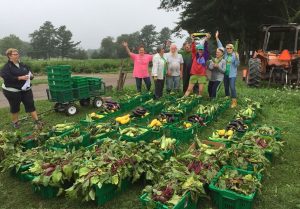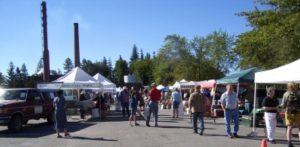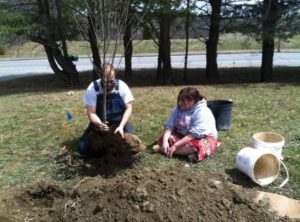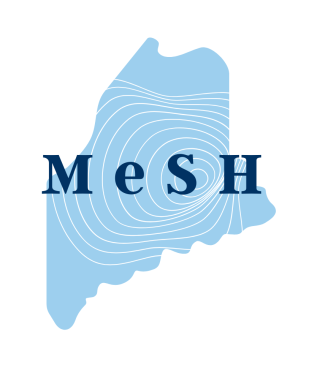Get Involved with the Local Community
Black Bear Food Guild
Established in 1994, the Food Guild is a community agricultural endeavor, initiated and developed by students in response to their desire to experience more hands-on learning. Students manage two acres of certified organic vegetable production and one acre under cover crop. The majority of the operating capital is from the sale of membership shares. Students provide fresh organically grown vegetables to about 40 shareholders. For more information, please contact Dr. Eric Gallandt at gallandt@maine.edu or 207-581-2933, or reach out on Facebook (blackbearcsa).
 Maine Harvest for Hunger
Maine Harvest for Hunger
Created as a part of UMaine’s Cooperative Extension in 2000, the Maine Harvest for Hunger program is a grassroots effort to encourage gardeners, farmers, businesses, schools, civic groups and others to donate high-quality fruits and vegetables to citizens in need. Through county-based networks, donated produce is delivered to food pantries, soup kitchens, community meals, and individuals across the state. Between 2000 and 2021, the program has collected and distributed more than 996 tons of donated fresh produce. They work with dozens of local partners across the state of Maine to distribute food to those in need throughout local communities. There are many ways that home gardeners, farmers, master gardeners, volunteers, businesses, schools, and civic groups can contribute to the program. Maine Harvest for Hunger has also posted various links and resources related to food preparation and storage, community garden planning and maintenance, food pantry and donation guidelines, other relevant Cooperative Extension programs, and many other aspects of gardening and food management. For more information about Maine Harvest for Hunger, please contact your county Extension office or extension.harvestforhunger@maine.edu.
Orono Community Garden
The Orono Community Garden produces more than just vegetables. It also develops a sense of community, promotes sustainability, and encourages healthy lifestyles. Orono’s first community garden was spearheaded by John Jemson, a water quality and soil specialist with UMaine’s Cooperative Extension. With the help of students and volunteers, the garden has expanded and now produces food for the community. A second garden was created as a part of the Children’s International Villages (CISV) to provide multi-generational benefits and opportunities to the local community. The CISV garden provides meals to the Bangor Area Homeless Shelter and offers help with cooking skills to properly prepare the food after it has been harvested. The first garden provides produce directly to individuals in need within the community. Volunteers assist with gardening, harvesting, and delivering the produce. The Orono farmer’s market has also gotten involved by donating money and leftover produce.
 Orono Farmers’ Market
Orono Farmers’ Market
The Orono Farmers’ Market is one of Maine’s larger markets with over twenty-five members offering a wide range of locally produced foods, open rain or shine. For information about farmers’ markets in other areas of Maine, look here. Shopping at local markets helps to support small business owners within the community. Feel free to reach out on Facebook (Orono Farmers’ Market), Twitter (Orono Farmers Market), or Instagram (oronofarmersmarket).
Orono Land Trust
The OLT is a local non-profit organization that helps to protect green spaces and protect access to trails throughout Orono. Most work is carried out by community volunteers, volunteer officers, and Board members. More than 4,000 acres of land are under their protection. The OLT always appreciates volunteers in their many activities such as removal of invasive species, trail maintenance, leading tours/activities, research, program coordination, fundraising, and educational outreach. Volunteers come from diverse personal and professional backgrounds and there are many ways to help. The Orono Land Trust also encourages individual landowners to consider conservation easements as a method of providing long-term protection to their land. Please contact the OLT at president@OronoLandTrust.org or PO Box 4, Orono, ME, 04473.
Orono Public Library
The Orono Public Library is Certified LEED Gold by the U.S. Green Building Council. LEED features include an energy efficient design, computer-controlled lighting and air conditioning systems, low-VOC materials, increased ventilation for improved indoor air quality, use of regional materials to boost the local economy, abundant natural light and views, water-efficient landscape design, and a radiant heating system in the floor. The Orono Public Library provides many valuable social, educational, and informational services to the community. Volunteers make many contributions to library programs.
Recycling in Orono
Single-stream is here! The single-stream, zero-sort recycling process is now fully implemented throughout the town of Orono. Orono is part of the Municipal Review Committee (MRC), a nonprofit organization representing 115 Maine communities that are working to ensure the affordable, long-term, and environmentally sound disposal of municipal solid waste. Residents can help these efforts by sorting their waste effectively to avoid throwing away recyclables or complicating the sorting process by putting trash in the recycling.
 Terrell House Permaculture Living and Learning Center
Terrell House Permaculture Living and Learning Center
The Terrell House supports a small resident community, various educational events, and a community garden. Terrell House is an inspiring space for hands-on learning, collaboration, research, and cooperative living. Incorporating principles of sustainable design, local food, and intentional community, Terrell House provides a location for interdisciplinary learning and research, events and workshops, a resident community, and a community garden. Terrell House strives to uphold a supportive environment, affordable housing, educational opportunities related to food production and preservation, outreach, and community building guided by the principles of permaculture. Terrell House provides hands-on learning opportunities and collaborative research projects to many academic departments. It has also pursued partnerships with the Edith Patch Center at Braeside, UMaine’s Cooperative Extension, and student organizations such as the Environmental Studies Coalition, Graduate Student Government, Green Team, SagE, and SEAD. Both visitors and volunteers are encouraged to get involved by participating in potlucks, skill share meetings, workshops, permablitzes, and community gardening activities. Contact UMaine’s Office of Sustainability at 207-581-1571 or sustainability@maine.edu for more information. Terrell House is located at 491A College Ave, Orono, ME, 04473.

